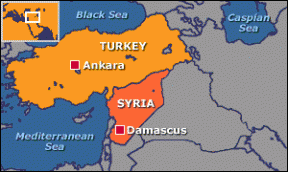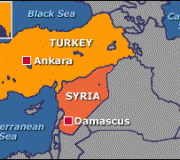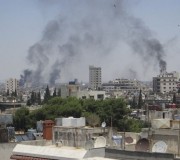 Of all Turkey’s neighboring states, Syria is considered to have the most complex and difficult relationship with it. The historical mistrust and territorial disputes, which originated in the early years of the tenth century as a result of the Arab struggle against the Ottoman Empire and continued in the French Mandate of Syria, worsened during the Cold War. In the 50s opposition was mainly ideological and it caused suspicions and hostility between the two countries that considered themselves the antithesis of a bipolar world. Turkey was the bastion of Western interests in the Near East and it maintained close relations with Israel while Syria aligned itself with Nasser and the Soviet-bloc. In the 80s and 90s the problem of exploitation of the waters of the Euphrates river caused another source of friction which, together with the various attacks and the territorial claims (such as the province of Hatay, formerly Sanjak of Alexandretta), stiffened the already difficult bilateral relationships.
Of all Turkey’s neighboring states, Syria is considered to have the most complex and difficult relationship with it. The historical mistrust and territorial disputes, which originated in the early years of the tenth century as a result of the Arab struggle against the Ottoman Empire and continued in the French Mandate of Syria, worsened during the Cold War. In the 50s opposition was mainly ideological and it caused suspicions and hostility between the two countries that considered themselves the antithesis of a bipolar world. Turkey was the bastion of Western interests in the Near East and it maintained close relations with Israel while Syria aligned itself with Nasser and the Soviet-bloc. In the 80s and 90s the problem of exploitation of the waters of the Euphrates river caused another source of friction which, together with the various attacks and the territorial claims (such as the province of Hatay, formerly Sanjak of Alexandretta), stiffened the already difficult bilateral relationships.
An opening in relations between the two countries took place in 2004 following the outbreak of the Iraq war with the official visit in Turkey of Syrian President Bashar al-Assad. During the same visit, in addition to signing a series of economic agreements on tax issues, investment and tourism, the territorial integrity and unity of Iraq was reaffirmed. After the Iraq war and the loss of Syrian control of Lebanon, the Syrian-Turkish relations increased also because Damascus was trying to overcome isolation and regional impasse. The common interests between the two countries were linked to the Iraq conflict and to the fear of the formation of a Kurdish state in northern Iraq. Furthermore, between the summer of 2007 and that of 2008, Turkish diplomacy, in addition to having made possible the implementation of important agreements in various subjects, took numerous actions to promote the signing of a real peace agreement between Syria and the State of Israel. For Israel, the core business of the peace process was based on the return of the Golan Heights to Syria, while it would have to suspend all support for Hezbollah and Hamas and to expel from Damascus the Hamas political leader, Khaled Mashaal. In addition, Syria would promise Israel an easing of diplomatic relations with the Islamic Republic of Iran. The insertion of Turkey within the peace process, inspired by the policy inaugurated by Ahmet Davutoglu, the “zero problems with neighbors” was severely compromised, between December 2008 and January 2009, following the launch of the Military Operation Cast Lead by the Israeli government against Hamas in the Gaza Strip. Those actions taken by the Israeli government and the subsequent sanctions against the occupied territories caused a strain in the diplomatic relations between Turkey and Israel that not even the inauguration of Barack Obama at the White House in January 2009 was able to relieve. In Autumn of 2010, Syria asked Turkey to vigorously resume the process interrupted in summer 2008. However, the first uprising in Dara’a in February / March 2011 were now close and the harsh repression perpetrated by the regime of Bashar al-Asad in tackling street protests of the Syrian spring has rapidly deteriorated Turkish-Syrian diplomatic relations to the point that Turkey has openly criticized the actions of the Alawite regime and has disrupted diplomatic relations between Ankara and Damascus.
Between May and June 2011, the Turkish government offered the Syrian people and the opposition of the Syrian Alawite regime the possibility of providing international resonance to its dissent, hosting in Antalya the Syria for Change conference, which subsequently facilitated the establishment of the Syrian National Council, or rather the main platform of opposition to the Ba’athist regime of Bashar al-Assad. This gradual rapprochement of Turkey to the forces of opposition to the Syrian regime and the parallel disruption of diplomatic relations with Ba’athist Syria has inevitably provoked tensions between Ankara and Tehran. The response was swift. In October 2011, the former commander of the Iranian Revolutionary Guards, Rahim Safani, harshly criticized the Turkish government, its projection of regional power, the weight of its relations with NATO forces and particularly the process of secularization promoted by Ankara towards Islam. The actions that Damascus decides to take towards Turkey will certainly be influenced by the position the latter will assume in relation to a hypothetical scenario of an armed intervention in Syria.
As is known, despite the recent condemnation of the massacre in the town of Hula by the UN Security Council and the incessant demands to Syrian authorities to stop the violence and to respect its commitments under the ceasefire, the use of military force in Syria does not seem to be a viable option because of the vetoes by the Russian Federation and the Republic of China. In recent weeks it seems rather more feasible that the prospect suggested by U.S. President Obama, following “the Yemeni model”, could open the way toward a “soft landing” which provides, in agreement with the Russian Federation, the exile of Bashar al-Assad, leaving a part of his government in power.
In addition to supporting the efforts of the Syrian opposition, it is evident that in this transitional scenario, Turkey could stimulate a dialogue with the various ethnic and religious groups of the country.
Among the alternatives to the regime of Bashar al-Assad, in fact, there is a direction towards an Islamic Syria, and from this point of view on several occasions, the Muslim Brotherhood said they were enthusiastic admirers of the Turkish model or a model able to overcome the secular authoritarian military creating a traditional and conservative system in terms of values, but distinctly liberal in terms of economic reforms.
A “new” Syria that is able to rise from the ashes of the regime of Bashar al-Assad will probably hasten to restore diplomatic relations with Turkey which were abruptly interrupted, could facilitate dialogue with Israel and would be forced to review their relations to the internal Iranian-led Shiite axis.
Nicola Censini LLM



